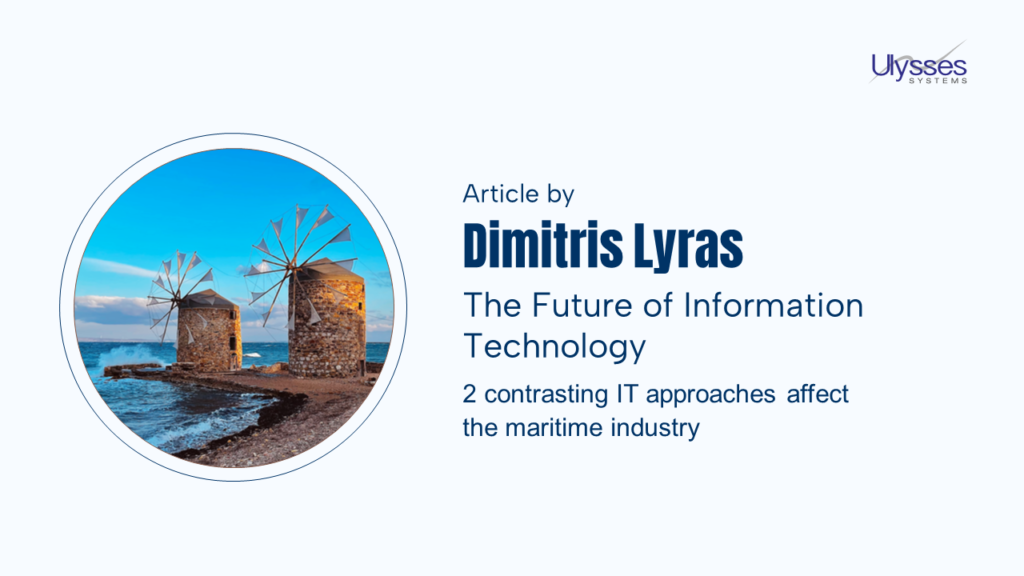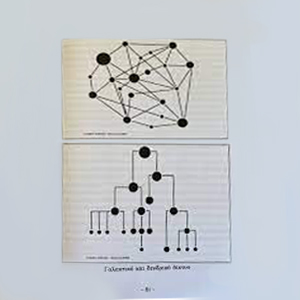
The Future of Information Technology
Two contrasting approaches affect the future of information technology
Two contrasting approaches affect the future of information technology especially in the maritime industry. At the AMMITEC party, 6 June, during the Posidonia 2024 Exhibition, Ulysses Systems founder Dimitris Lyras stressed the suitability of Mediterranean thinking for information technology going forward. He boldly or perhaps too boldly predicted that in 30 years Greece would lead the IT industry worldwide. His prediction may seem like sound bites but there are samples of rationale based on previously published material that indicate that it was not a fleeting thought.
Greeks and our Diaspora
And how Information Technology
and our business sense will join us all together
by Dimitris Lyras
Information Technology in the Maritime Industry
by Dimitris Lyras
The two articles quoted here are commentaries on Professor George Prevelakis’ book, Xylina Teichi (Wooden Ramparts), published by Economia Publishing, January 2020. Xylina Teichi (Wooden Ramparts) is a scholarly and insightful overview of geopolitics and how the Greek mentality has succeeded and failed in politics and growth around the world. Professor George Prevelakis maintains that ramparts must fall and that the future of Greece is opening towards sea routes and flexible networking.
Biases toward structure versus biases towards fluidity and adaptability
As a core theme, Xylina Teichi (Wooden Ramparts) elaborates on the different mentality expressed by biases toward structure versus biases towards fluidity and adaptability. The author uses the terms ‘tree form’ and ‘galactic’ to name these two contrasting approaches. His authority on the subject comes not least from his permanent membership as ambassador to the OECD.
The two contrasting approaches to understanding the world
There is a diagram in the book that shows the two contrasting approaches to understanding the world. These figure between the hierarchical ontological thinking typical of North European (tree form) culture and the graphical, multi-linked common sense culture of southern Europe (galactic form). Also, a related work by MIT professor, Michael Dertouzos, mentioned in the book, discusses why and how technology should be made to work for humans. It goes on to state that until this goal has been met the computer revolution is ‘unfinished’.

This contrast in mentality, as described by Professor George Prevelakis, is perhaps a little too black and white to describe human attitudes as most people likely use both methods of thinking. But his book requires this contrast to make a profound development in understanding Greece and geopolitics. It also points to the differentiation between scientific and North European preferences in describing the world, in contrast to the merchant and South European ways of looking at the world.
Contrasting approaches in Information Technology
These same contrasting approaches exist in information technology between the scientists and the merchant class, common sense thinkers. Notably, over the last 50 years, it is the scientists who have led in pushing forward the development of information technology. While the merchant class, common-sense thinkers demand but also contribute to making information technology understandable and thereby more useful to society.
The current article contribution
The current article discusses how the two contrasting approaches affect the future of information technology, especially in the maritime business. First published in two parts in 2022, in Economia magazine*, here Dimitris Lyras develops the debate further and first introduced it in the frame of this year’s Ammitec party at Posidonia 2024 Exhibition.
*Since 2023, Economia has changed owners and management
The rigidity of information technology
Most of us have experienced the rigidity of information technology and not only the IT end users. But also, significantly, as true IT experts and core enablers of information technology proliferation in shipping. As such we have observed that end users in Greek shipping have from time to time found IT too much trouble for the benefit it offers. This is especially true for the top management of Greek shipping companies, involved in so many problems and opportunities that information technology does not touch. For example, concerns such as how to renew their fleets under the current environmental targets, how to face their chartering opportunities, interpret local market activity, etc. So when we envision the future of information technology the rigidity in IT should preoccupy us.
Information technology as an enabler
However information technology as an enabler is what IT was meant to be. What it is destined to be. We see the huge potential of information technology. We believe it can become an ever improving enabler for the Greek shipping cluster even at the board room level, perhaps even more so than for shipping clusters elsewhere.
More importantly Greek IT experts have the potential to become world leaders in managing maritime IT across the enterprise fleets they manage. And Greek software engineers have the potential to become world leaders in software development, not just in shipping but in all industrial sectors.
The reason for such confidence in Greek software developement is the suitability of Mediterranean thinking for information technology. One of the virtues of Mediterranean thinking is the practical way of life that favours learning from experience.
Greek shipping is founded on common sense
Therefore, the fundamental reason for these bold and perhaps over optimistic sounding predictions is the premise that Greek shipping is founded on common sense. In other words, instant situation awareness when faced with risk or opportunity and immediate problem-solving, no matter how challenging. It’s a mentality of passion, even to the point of sacrifice.
So, the proposition that Greek shipping is founded on common sense may well be a proposition for information technology going forward. That IT can be founded on common sense sounds radical perhaps. But the challenges of IT going forward in all areas of human endeavour is very much about how IT fits in with people’s thinking and working, their understanding of the world and how they solve problems. Situational awareness, i.e. tuning into people’s focus of concerns and the world around these concerns are highly developed skills of the Greek shipping community. And the Greek shipping IT community is an integral part of Greek shipping.
The scientific bias
As already mentioned, the bias towards scientific specialization positions the latter as superior to science based on common sense, which arises from personal and communal experience. So it comes as no surprise that common sense is not a term used widely by the broader IT community, or at least not in association with software design. Any more than common sense was a term emphasized by the auto industry during its huge proliferation.
In part, because large IT companies have mostly grown out of engineering and scientific backgrounds, and in part because the large “status quo” companies in IT want to be the thought leaders. Being considered scientific is, therefore, important. And also, common sense does not fit in with promoting their formidable competitive advantages in proliferating their one-size-fits-all business model.
Truth be told, one-size-fits-all, as an approach, couldn’t be further from common sense and caring. Because common sense will immediately posit that there is no size that fits all. So, common sense, immediately then, takes a position of caring about differentiation and creating a whole understanding around situation awareness and process variation. And paradoxically, the one-size-fits-all approach is scientifically unfounded! Let’s however examine how software design de-emphasizes common sense.

De-emphasizing common sense in software
A practical outline of widespread software development practice will help explain what de-emphasizing common sense in software is. For example, the software developer status quo continues to be one where developers work with entities and entity relationships within data models to describe processes and software systems.
As a technical concept, this renders current software unable to expose how it works. The reason it cannot do so is that the code is unstructured and only the data is structured. As a result, what the software actually does needs deep and painstaking analysis. But this is out of step with how urgently we want software to be understandable and extensible.
Yet, the difficulty to expose unstructured code has not been a problem in so far as IT challenges have usually been technical in nature. As such they often benefit from large “manufacturers” in the way that hugely expensive developments often do. We are referring to developments like data storage capacity, storage and retrieval performance, processor performance, virtualization, cloud protocols, and many, many more.
Moving into the realm of human processes and intelligence
However Big Data, Machine Learning and, recently, Large Language Models are moving into the realm of human processes and intelligence.
So, having overcome technical challenges, IT begins to engage more deeply with people and their thinking. Subsequently, as the technical aspects become far less important, computers understanding the human world becomes more important. As a result, we cannot help but realize that IT has enormous relevance to human endeavour; far more than any manufactured goods had in the industrial 19th and 20th centuries.

For example, we have seen how IT has expanded into human relationships in social sites, matching of people and other Human Resource activities. And IT continues advancing in predicting trends, predicting economic activity, in pricing, in capacity forecasting for socio economic issues etc.
IT will move into the domain of how people make decisions
So, it becomes more and more likely that the future of IT proliferation is to move into the domain of how people make decisions at all levels of the maritime enterprise, including on board ships.
So, going back to Professor George Prevelakis’ book, we can dwell a little more on the contrast between North European scientific thinking and southern European merchant and common-sense thinking. And let’s consider a intriguing addition that has come to supplement the terminology and the hitherto scientific understanding of intelligence. Briefly, North European thinking, in order to correct an overly rational approach to thinking, has introduced the term EQ, emotional intelligence.
EQ
EQ is a prerequisite without which the analysis of a situation is lacking. Because scientific analysis alone does not give enough weight to the subjective experience of the protagonists in a given situation.
How long exactly has this term been in circulation? Apparently, “although the term first appeared in 1964, it gained popularity in the 1995 bestselling book ‘Emotional Intelligence’ by science journalist Daniel Goleman.”

So, the term is popular and quite recent in some areas of the world and rather peculiar in others. For example. Here among Greeks the term is awkward: ‘synesthimatiki noimosini / συναισθηματική νοημοσύνη’. And it is a term you would have a problem communicating in a retiree coffee shop anywhere in Athens or Piraeus. Perhaps Greeks have trouble with the term ‘emotional intelligence’ because there has never been a need for such a delineation of intelligence. And therefore, no compelling need to create the grounds for it.
Nevertheless, one wonders! After 8000 years of recorded history, the need for EQ must have surfaced as an essential skill. So the term should have come up earlier. Why hasn’t it, we may well ask? Only to follow-up with the reasonable scenario of grandmothers passing on their emotional intelligence so that it became as natural to us as dressing a wound after a fall. And so EQ was a skill that was understood and never discussed.
A possible explanation for the need to coin the term EQ, is that in the last 200 years it is science, which has been pivotal in predetermining what intelligence means. So the need for a term to describe the reality of “emotional intelligence” arose in order to further qualify ‘intelligence’ (intellegere (latin): understanding).
Broad intelligence is better off when it includes emotional intelligence
This, then, is a strong indication that the North European and scientific world has come to the realization that broad intelligence is better off when it includes emotional intelligence. Which probably includes common sense, agility in thinking and a strong understanding of cause and effect based on experience. Furthermore, this may be just as important as high scores in mathematics and science.
Well-rounded software skills development
So rigid, ontological and hierarchical and rule-based relationships are not the only sought-after goals for well-rounded software skills development. There is a host of examples indicating the need in software for what, in this article, we have described as the common sense approach to design. Another way of describing this approach is the necessary resilience and flexibility to cope with the constant need for important decision making.
Prediction is more than optimism
Prediction is bold but it has an edge over optimism because optimism could be wishful thinking. A prediction, however, is based on facts and pragmatism. Therefore at the AMMITEC party at the Posidonia 2024 Exhibition we made a prediction. Namely that the resilience and flexibility that has make the Greek shipping industry great, may soon make the Greek IT industry just as great.
Professor Michael Dertouzos is an inspiration when he discusses why and how technology should be made to work for humans. Especially when he states that until this goal has been met the computer revolution is ‘unfinished’. Finally, keeping Shipping IT working without issues under massive commercial pressure and challenges, in itself, is already a formidable achievement. And perhaps developing the world’s best software as a result of our collective, flexible, practical and humanist thinking is within our reach.
Ulysses Systems is a Maritime Software specialist, with more than a decade of experience in unique and patented technology for continuous data model extension and integration, which are now being incorporated into all Ulysses maritime products.
Its award-winning Task Assistant® Software enables office and seagoing personnel to work intuitively and efficiently with minimal training and just-in-time information.
Managers should expect a fast return on total software lifecycle cost thanks to mature process optimization, bridging of information gaps and refined integration technologies.
